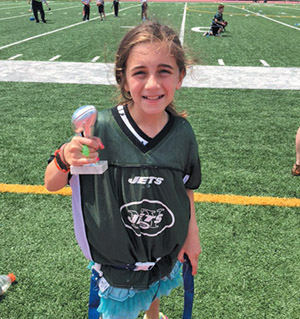
“Do you want to play football?” I asked my 9½-year-old daughter one afternoon after school. I had signed up my son, 8, for the spring session of flag football, and noticed it said “coed.” If we were already dedicating our Sundays to one child playing, and had no other extracurricular activities scheduled, I figured why not bring two?
“Yeah!” she said. “I could try it…” She frequently plays on the lawn with my husband and son on Friday afternoons and seemed to know how to catch, throw and run, which is probably all the skills you really need to succeed in the game.
I requested on the form to please place her on a team with any other girls, to help her feel comfortable in this male-dominated sport. But when we receive our team rosters, there clearly are none, not even boy-names that could really be for a girl, like Elisha or Brynn. And I have never heard of a female named David.
“I think you’re the only girl on the team,” I say, preparing her for the gender shock. “But if you don’t want to do this, you don’t have to.” I would definitely not want to be doing this. In fact, I even felt awkward walking over to the team, like people were turning to me and thinking I was lost or at the wrong sporting event, that this wasn’t TBO or US Gymnastics (although, admittedly, I sent my son to gymnastics as well for half a year).
While I don’t define myself by the label of feminist or sexist, and am aware that there are many out there who are passionate in those sentiments, I am a believer that kids should participate in things that interest them, regardless of our cultural norms. “Just try it,” I whisper in her ear, as she hesitantly stood on the edge of the playing field. “If you don’t like it, you don’t have to do it again.”
But she did like it. She liked it so much that she couldn’t wait for her next game. I think what she cherished was feeling both unique and included. She was doing something that none of her friends were doing, and overcame her (and my) fear of not fitting in. Even when another mom on the sidelines asked a nearby parent, in loud, plain Hebrew—which my daughter perfectly understood—if she was also playing on the team, my daughter didn’t flinch at this woman’s obvious doubt of her capabilities. (“She must think I wasn’t Jewish, too…” she told me later.)
Her coaches were amazing, always giving her time to play, and even enabling her to score. It also helped that her team was undefeated and it didn’t really matter if they had the slight handicap of having a female on the board who perhaps didn’t play as hard or rough as everyone else. She was there to win the championship game and to celebrate in the victory of winning alongside her male counterparts.
My daughter frequently complains that she is not like everyone else. That we do things differently. Her name is way too long and nobody else has it. She is the only one who has to daven on Sundays. Everyone else can watch as much TV as possible, or eat a whole package of Oreos for breakfast. And my response is, “Be yourself. Everyone else is taken,” a quote that I did not make up, but have seen several times. But sometimes, “being yourself” takes some guidance and rules from parents, but also the ability to break boundaries and face personal challenges. Playing football on a team of big boys was one of those uniquely defining moments of becoming “herself.”
I have to say that my daughter surprised me. I was filled with doubt—perhaps the same skepticism that the sidelined mother expressed, in her “disguised” Hebrew questioning. But that first day on the football field, my eldest child showed me an aspect of herself I hadn’t known—a confidence, a fearlessness. And I’m glad I pushed her to be different, even if her name has 10, sufferingly long, letters.
Sarah Abenaim is a freelance writer living in Teaneck. She can be reached at SarahAbenaim@gmail.com.
By Sarah Abenaim










